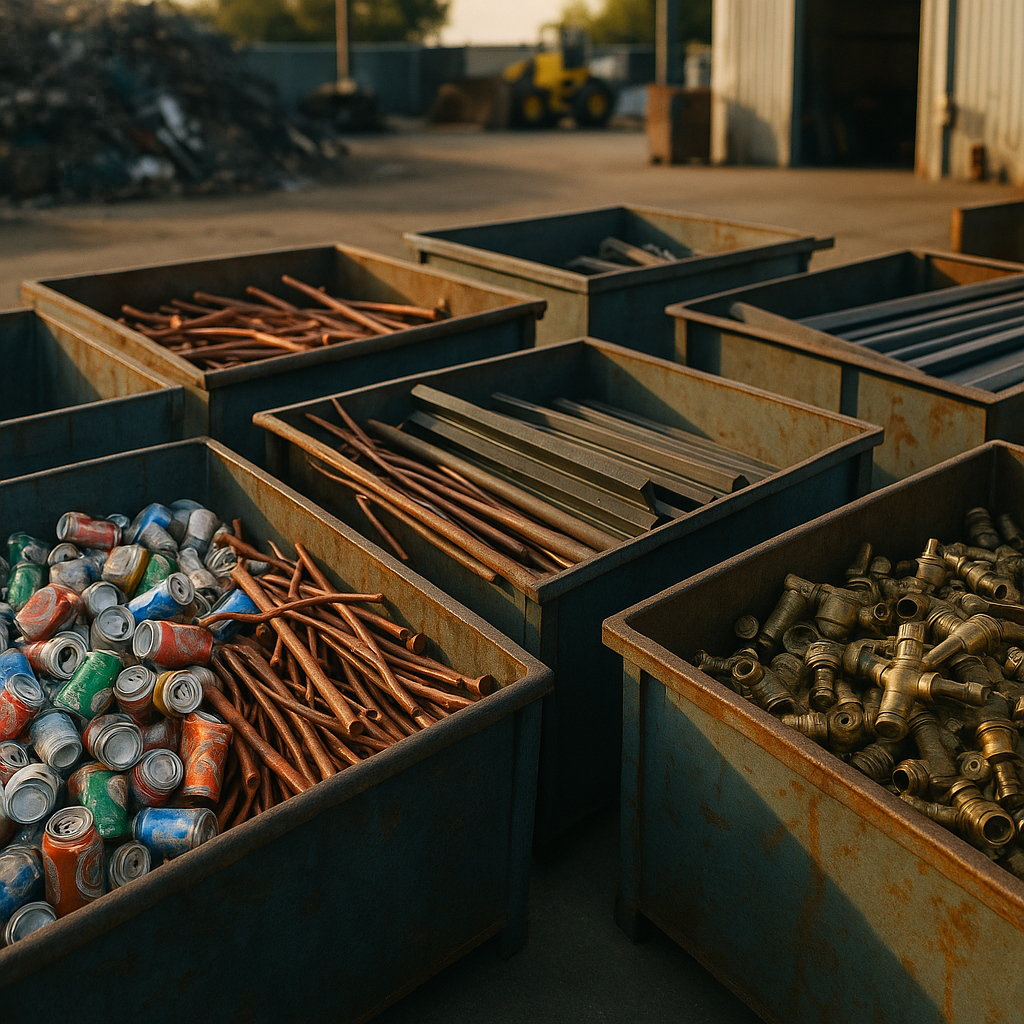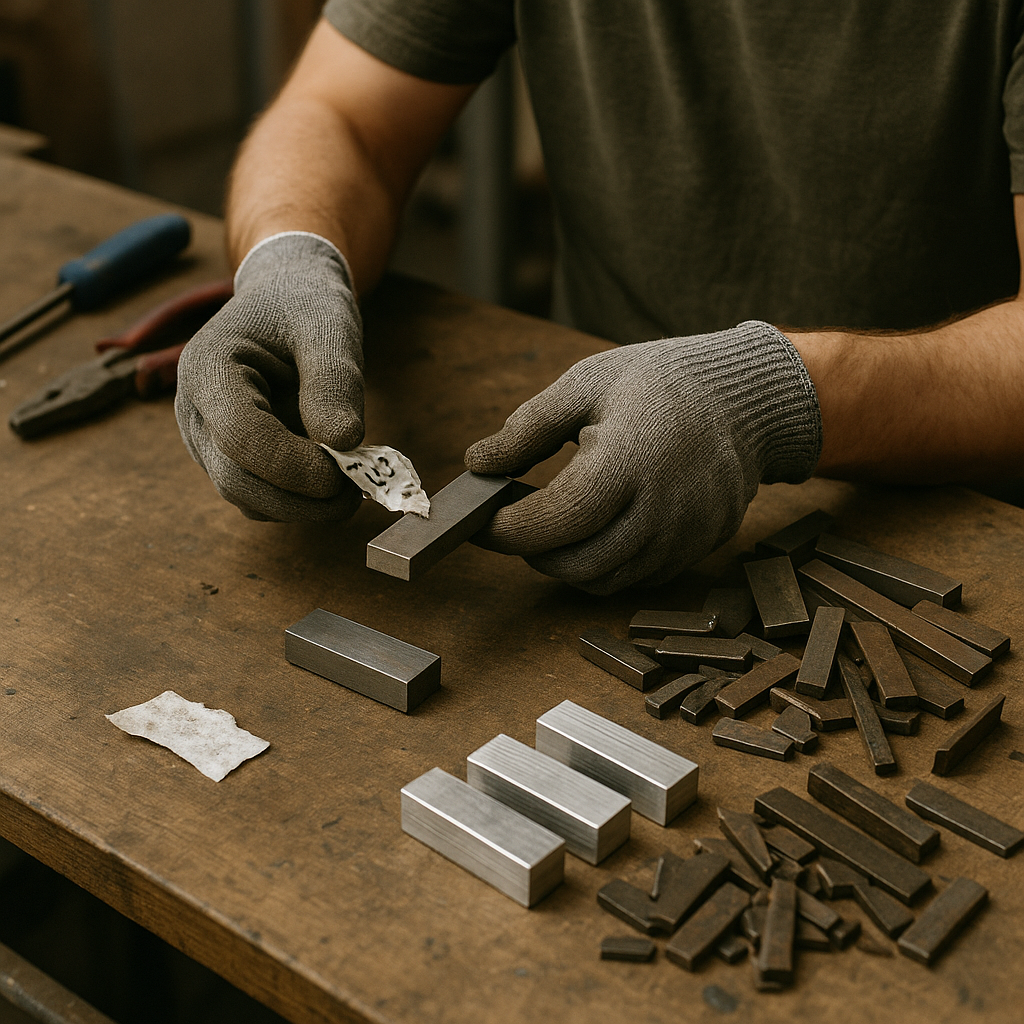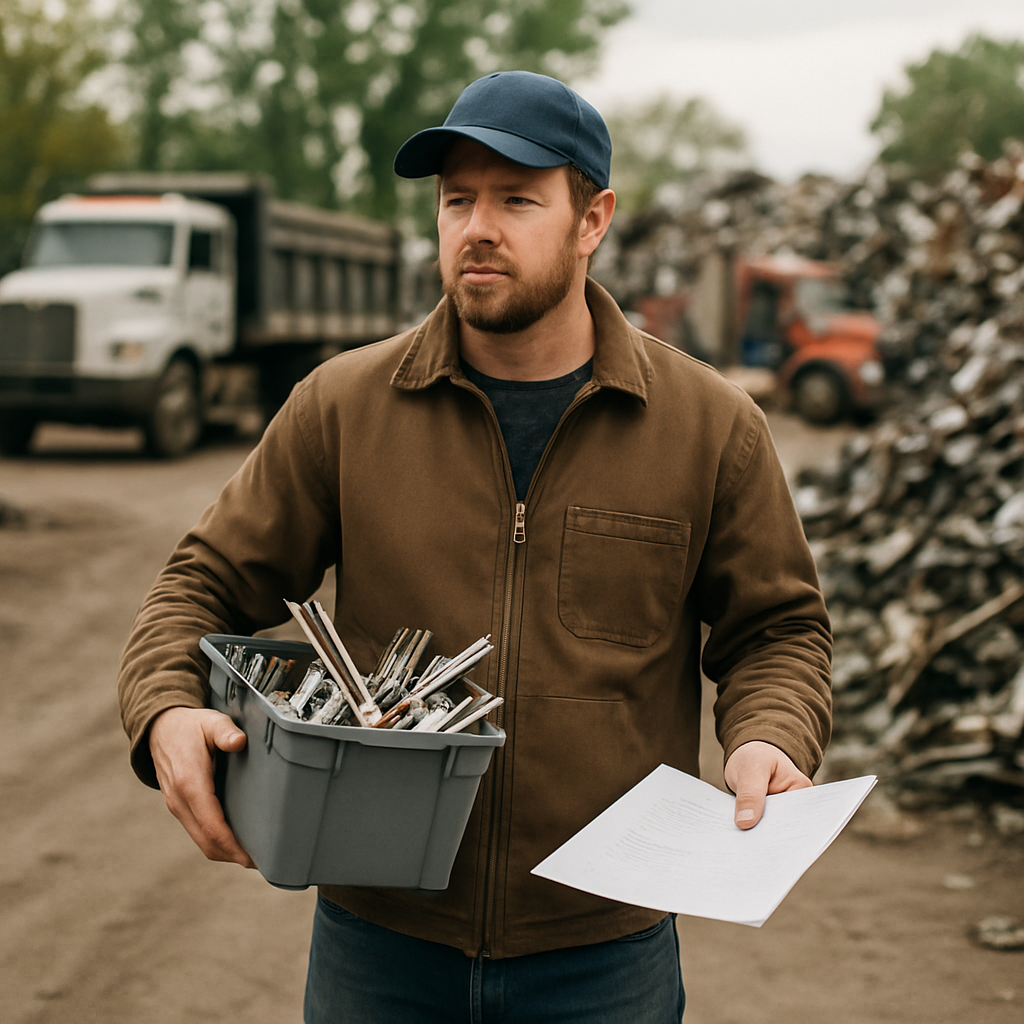5901 Botham Jean Blvd, Dallas, TX 75215
Metal Recycling Near Me: A Guide to Finding Trusted Services
August 22, 2025Searching for metal recycling facilities nearby involves finding local centers that accept and process scrap metal materials for reuse. These services convert discarded metal items into valuable resources instead of sending them to landfills. When looking for metal recycling options in Dallas, you seek facilities that can properly handle various metal types while offering fair compensation.
Okon Recycling is a cornerstone in Dallas’s recycling industry. Established in 1913, this family-owned business has provided essential scrap materials to numerous industries for over a century. Their 20-acre, state-of-the-art facility accepts both ferrous metals (containing iron) and non-ferrous metals (such as copper, aluminum, and brass).
Trusted metal recycling services are distinguished by their commitment to sustainability and customer service. Okon Recycling offers tailored solutions for both industrial and residential clients. Their team works to divert millions of pounds of waste from landfills each month through responsible processing techniques and environmental stewardship.
What Types of Metals Can Be Recycled at Local Facilities?

Local metal recycling facilities accept a wide range of metal materials, typically categorized into two main types: ferrous and non-ferrous metals. Understanding the difference between these categories can help you properly sort your scrap and potentially maximize its value.
Ferrous Metals
Ferrous metals contain iron and are magnetic. The magnet test is an easy way to identify ferrous metals at home or work. If a refrigerator magnet sticks to the metal item, it’s ferrous.
Common ferrous metals accepted at recycling facilities include:
- Steel (found in appliances, construction materials, and food cans)
- Cast iron (old pans, skillets, bathtubs, and radiators)
- Structural steel (beams, pipes, and rebar from construction)
- Wrought iron (decorative fencing, railings, and furniture)
While ferrous metals generally have a lower scrap value than non-ferrous metals, they make up the largest volume of recycled metal and are vital to manufacturing industries.
Non-Ferrous Metals
Non-ferrous metals don’t contain iron and aren’t magnetic. They are typically more valuable at scrap yards due to their properties and market demand. These metals are generally more resistant to corrosion and often more malleable than ferrous metals.
Valuable non-ferrous metals accepted at most facilities include:
- Aluminum (beverage cans, window frames, and outdoor furniture)
- Copper (electrical wiring, plumbing pipes, and electronics)
- Brass (door knobs, light fixtures, and decorative items)
- Lead (old piping, car batteries, and roofing materials)
- Stainless steel (kitchen sinks, appliances, and cookware)
- Zinc (gutters, roofing materials, and die-cast items)
Non-ferrous metals like copper and brass can fetch significantly higher prices per pound than ferrous metals, making them particularly worthwhile to separate and recycle.
Common Recyclable Items
Many everyday items contain recyclable metals that local facilities will accept. These include:
- Household appliances (refrigerators, washing machines, microwaves)
- Automotive parts (catalytic converters, radiators, transmission parts)
- Construction debris (metal roofing, wiring, pipes, and fixtures)
- Electronics (computers, phones, and other devices with circuit boards)
- Kitchen items (pots, pans, utensils, and can openers)
- Outdoor equipment (lawnmowers, garden tools, and metal furniture)
Some items may contain both ferrous and non-ferrous components. For example, an old washing machine has a steel exterior (ferrous) but may contain copper wiring and motors (non-ferrous). Separating these components before recycling can maximize your returns.
Proper Sorting for Maximum Value
Taking the time to sort your metals before visiting a recycling facility offers several advantages:
- Higher payouts for properly separated metals
- Faster processing at the recycling center
- More efficient recycling processes
The simplest sorting method is using a household magnet. Items that attract the magnet go in the ferrous pile, while those that don’t, go in the non-ferrous pile. For large amounts of scrap, contacting your local facility beforehand can help you understand their specific requirements and current rates.
How Do I Prepare Scrap Metal for Recycling?
Separate Ferrous from Non-Ferrous Metals
The first step in preparing scrap metal for recycling is proper separation. Use a magnet to identify ferrous metals like steel and iron. If the magnet sticks, you have ferrous metal. If it doesn’t, you’re dealing with valuable non-ferrous metals such as copper, aluminum, brass, or stainless steel.
Non-ferrous metals usually command higher prices at recycling centers. Keep these metals separate from each other to maximize your return. Many recycling facilities will pay less if metals are mixed, often defaulting to the lowest-value metal in the batch.
For quick identification, copper has a reddish-brown appearance, aluminum is lightweight with a silvery color, and brass displays a yellowish hue with hints of red.
Remove Non-Metallic Components
Stripping away non-metal parts is crucial for increasing the value of your scrap. Remove plastic handles, rubber gaskets, wood attachments, and other non-metal components before recycling. For insulated copper wire, consider using wire strippers to remove the plastic coating, as bare copper fetches a significantly higher price.
Clean your metals to remove dirt, grease, paint, and other contaminants. While small amounts of rust or paint are acceptable, excessive contamination can reduce your scrap’s value. Recyclers prefer clean metals because they’re easier to process and yield higher-quality recycled materials.
Take special care with items that might contain hazardous materials. Old appliances may contain refrigerants or oils that require proper disposal. Always inform recycling centers if your scrap has been exposed to hazardous substances.
Special Considerations for Electronic Waste
Electronic devices contain valuable metals but require special handling. Components like circuit boards, computer parts, and cell phones often contain small amounts of precious metals, including gold, silver, and platinum.
For e-waste recycling, seek out specialized recyclers equipped to handle these materials safely. They can properly extract valuable metals while safely disposing of hazardous components like batteries or mercury switches.
Before transporting electronic waste, remove any personal data from devices and, if possible, separate components by type. Many recyclers prefer electronics that are partially disassembled.
Store and Transport Safely
Proper storage keeps your sorted metals organized and prevents contamination. Use labeled containers for different metal types. Bins, buckets, or even cardboard boxes work well for smaller pieces. This organization streamlines the recycling process and helps prevent mixing high-value metals with lower-value ones.
When transporting scrap metal, secure your load properly with sturdy straps or chains. Loose items can become road hazards and result in fines. Cover your load with a tarp to prevent items from falling off during transport. This is not just good practice—it’s often required by law.
For heavy items, use appropriate equipment like dollies or hand trucks. Never exceed your vehicle’s weight capacity. If you have a substantial amount of scrap, consider making multiple trips or using a trailer rated for heavier loads.
What Should I Know Before Visiting a Scrap Yard?

Contact the facility directly to verify their operating hours, as many yards close earlier than posted times if they reach capacity. During this call, confirm they accept the types of metals you plan to bring, as some facilities specialize in certain materials while refusing others due to processing limitations.
Inquire about documentation requirements during your initial contact. Most scrap yards require valid government-issued photo ID for all transactions, a process that prevents the exchange of stolen materials. Certain high-value items like catalytic converters may require additional proof of ownership.
Understand the facility’s payment policies before arrival. Cash payments are restricted for certain materials in many states; some yards issue checks for transactions over specific amounts or for particular metal types, and electronic transfers might be the only option for larger loads.
Check their hazardous materials policies. Items containing mercury, refrigerants, oils, or other potentially harmful substances often require special handling. Many facilities charge disposal fees for these components or may refuse them entirely.
Prepare your materials properly before loading them for transport. Separate different metal types into distinct containers to maximize your payout, as mixing valuable metals like copper with lower-value materials like steel can result in receiving only the lower rate for the entire batch.
Secure your load thoroughly for transportation. Use straps, ropes, or nets to prevent items from shifting or falling during transit, as unsecured materials create road hazards and can result in fines if noticed by law enforcement.
Wear appropriate safety gear when handling scrap metal. Heavy-duty gloves, closed-toe shoes, and eye protection prevent injuries from sharp edges and metal fragments. Long sleeves and pants offer additional protection against scrapes and cuts.
Plan to arrive early in the day if possible, as morning visits typically mean shorter wait times and more attentive service, leading to potentially more accurate assessment of your materials.
Conclusion: Maximizing Value in Metal Recycling

Metal recycling is a highly effective strategy that offers both environmental and economic benefits. In this article, we’ve discussed how proper sorting, thorough cleaning, and the removal of contaminants significantly enhance the value of recyclable metals. By separating ferrous from non-ferrous metals and maintaining materials free of paint and coatings, you can achieve better prices while contributing to resource conservation and reduced energy consumption.
The recycling process extends beyond preparation. Selecting reputable facilities with transparent pricing, staying informed about market trends, and understanding facility-specific requirements are essential steps to maximize the value of your scrap metal. Every ton of recycled metal not only generates revenue but also prevents unnecessary mining and substantially reduces greenhouse gas emissions.
Contact Okon Recycling at 214-717-4083 for your recycling needs and join us in building a more sustainable, resource-efficient future.
